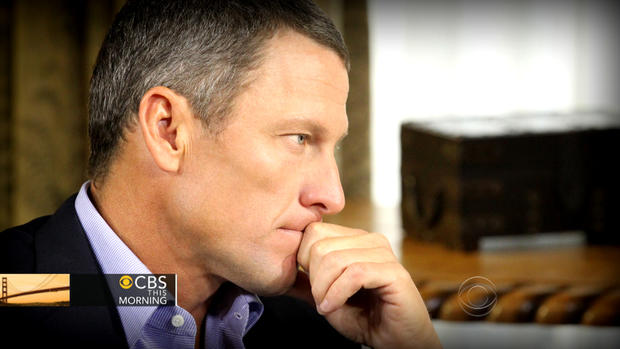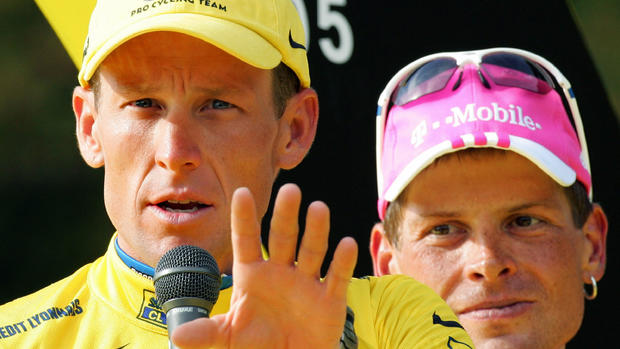Lance Armstrong now faces Justice Department in lawsuit
Updated at 7:25 p.m. ET
WASHINGTON The Justice Department has joined a lawsuit against disgraced cyclist Lance Armstrong that alleges the former seven-time Tour de France champion concealed his use of performance-enhancing drugs and defrauded his long-time sponsor, the U.S. Postal Service, the government said Friday.
The suit the Justice Department is joining was filed in 2010 by former teammate Floyd Landis, who was stripped of his 2006 Tour de France title for doping.
The Justice Department announced its involvement in the case Friday afternoon, saying Armstrong, team manager Johan Bruyneel and team owner Tailwind Sports had "illegitimately procured" tens of millions of dollars.
"Lance Armstrong and his cycling team took more than $30 million from the U.S. Postal Service based on their contractual promise to play fair and abide by the rules — including the rules against doping," Ronald Machen Jr., U.S. attorney for the District of Columbia, said in a statement.
Earlier in the day, Armstrong's team said lengthy talks with the government had failed.
"Lance and his representatives worked constructively over these last weeks with federal lawyers to resolve this case fairly, but those talks failed because we disagree about whether the Postal Service was damaged," Armstrong attorney Robert Luskin said in a statement to news outlets, including CBS News.
Luskin cited Postal Service studies showing it had benefited from the sponsorship to the tune of more than $100 million. Still, Mary Anne Gibbons, the agency's general counsel, said in the Justice Department statement that the Postal Service "strongly supports" the department's intervention.
Settlement discussions had been under way between the Justice Department and Armstrong's lawyers. A person familiar with the negotiations told The Associated Press the two sides are tens of millions of dollars apart on how much Armstrong should pay to settle the case. The person spoke on condition of anonymity because the source was not authorized to speak on the record about the private talks.
Last month, "CBS Evening News" anchor Scott Pelley reported that Armstrong offered to pay more than $5 million to the government to compensate for the fraud he allegedly committed against the Postal Service.
Armstrong also offered to be a cooperating witness in a federal investigation, Pelley reported. The Justice Department rejected both offers as inadequate.
The Landis lawsuit was filed under seal, but it will be unsealed with the Justice Department decision to join or, in essence, take over the case.
Armstrong was the subject of a two-year federal grand jury investigation that the Justice Department dropped a year ago without an indictment.
Throughout his career, Armstrong always denied drug use. But, in 2011, another teammate, Tyler Hamilton, told "60 Minutes" Armstrong did use banned substances, including the blood doping agent EPO. "He took what we all took," said Hamilton, "really no difference between Lance Armstrong and I'd say the majority of the peloton, you know. There was EPO, there was testosterone. I did see a transfusion -- a blood transfusion."
Armstrong confessed of drug use in an interview last month with Oprah Winfrey. "I viewed this situation as one big lie that I repeated a lot of times," he said in that interview.
In October, the U.S. Anti-Doping Agency released a report that included affidavits from 11 of Armstrong's former teammates. These affidavits detailed how the teammates were supplied with EPO — a banned energy-boosting hormone that stimulates red blood cell production — by Armstrong and saw him inject, and how they were pressured to dope and bullied by Armstrong and Johan Bruyneel, the team manager. The cycling world's governing body then stripped Armstrong of the seven Tour de France titles he won from 1999 to 2005.
As Pelley reported, the Justice Department dropped a criminal investigation of Armstrong a year ago. The evidence against him now first came out in secret testimony in that criminal case. But the Department of Justice dropped the case, without explanation, before a grand jury had a chance to vote on indictments. That's when the head of the U.S. anti-doping agency, Travis Tygart, pressed ahead and brought Armstrong down.
"I thought it was absolutely appropriate," Tygart told Pelley in a "60 Minutes" interview" about his reaction when he heard the Justice Department was going to investigate on whether criminal charges were appropriate. "And it was the right thing to do. Federal taxpayers -- close to $40 million -- were paid to this team to run what we now know was the most sophisticated and professionalized drug program that the world's ever seen."
After the criminal investigation was dropped, Tygart pressed ahead and brought the evidence that ended in Armstrong losing his titles and being banned from sport for life. Last month, he sent a letter to the U.S. attorney general asking him to join the civil fraud lawsuit. Tygart wrote that Armstrong's scheme was "one of the greatest frauds in the history of sport." He also described Armstrong's previous denials as "cold,calculated lies."
"I think a jury should have an opportunity to decide whether the tens of millions of taxpayer dollars that were defrauded by this team and Lance Armstrong and his associates," said Tygart, "whether or not the government should be paid back for that.
Tygart's U.S. anti-doping agency said Friday the lawsuit "holds promise for returning the many millions of federal dollars in ill-gotten gains generated by this fraud."
Under the False Claims Act, citizens can act as whistleblowers and sue to recover money they believe was obtained through fraud against the federal government. These suits remain under seal until the Justice Department decides whether it thinks there is enough merit in the case to take it over. The private whistleblower receives a percentage of any money ultimately recovered.
Armstrong and USADA officials talked on and off over a couple of months about the terms under which the cyclist might sit down for a long interview to tell all he knows about doping in cycling, but Armstrong said he would not cooperate.
A person familiar with discussions between Armstrong and USADA, who spoke to the AP on condition of anonymity because the discussions were private, said among the topics was how much protection USADA could provide Armstrong in the whistleblower case and against possible criminal action. The cyclist and his attorneys ultimately were not satisfied with USADA's offer, the person said.
In commenting Wednesday on Armstrong's refusal to talk, Tygart said that, "over the last few weeks he has led us to believe that he wanted to come in and assist USADA but was worried of potential criminal and civil liability if he did so."
If the Justice Department ends up taking the whistleblower case all the way to trial, a key issue is likely to be whether the Postal Service suffered financial harm from the drug scandal.
The government must prove not only that the Postal Service was defrauded, but that it was damaged in some way.
The government could argue that all of the recent controversy tarnishes the whole sponsorship and has damaged the Postal Service.
But the USPS sponsorship ended long ago and relatively few people reading stories about the current controversy are associating Armstrong with the post office. Armstrong's last sponsor for his final two Tours de France was Radio Shack, in 2009 and 2010.
The studies for the Postal Service state that the agency reaped at least $139 million in worldwide brand exposure in four years — $35 million to $40 million for sponsoring the Armstrong team in 2001; $38 million to $42 million in 2002; $31 million in 2003; and $34.6 million in 2004.
Despite those numbers, Armstrong is fighting an uphill battle.
The government has a potentially strong weapon on its side: An argument could be made that until recent months there was an active, ongoing conspiracy to cover up Armstrong's alleged fraud. If the case ever goes to trial, that argument could persuade a judge to allow in a huge amount of evidence on Armstrong's use of performance-enhancing drugs dating back to the 1990s — evidence that would be barred from the government's court case as too old if there were no extended conspiracy.
As CBS News correspondent Bob Orr reported, if the government wins, Floyd Landis could get up to a fourth of the total damages.

